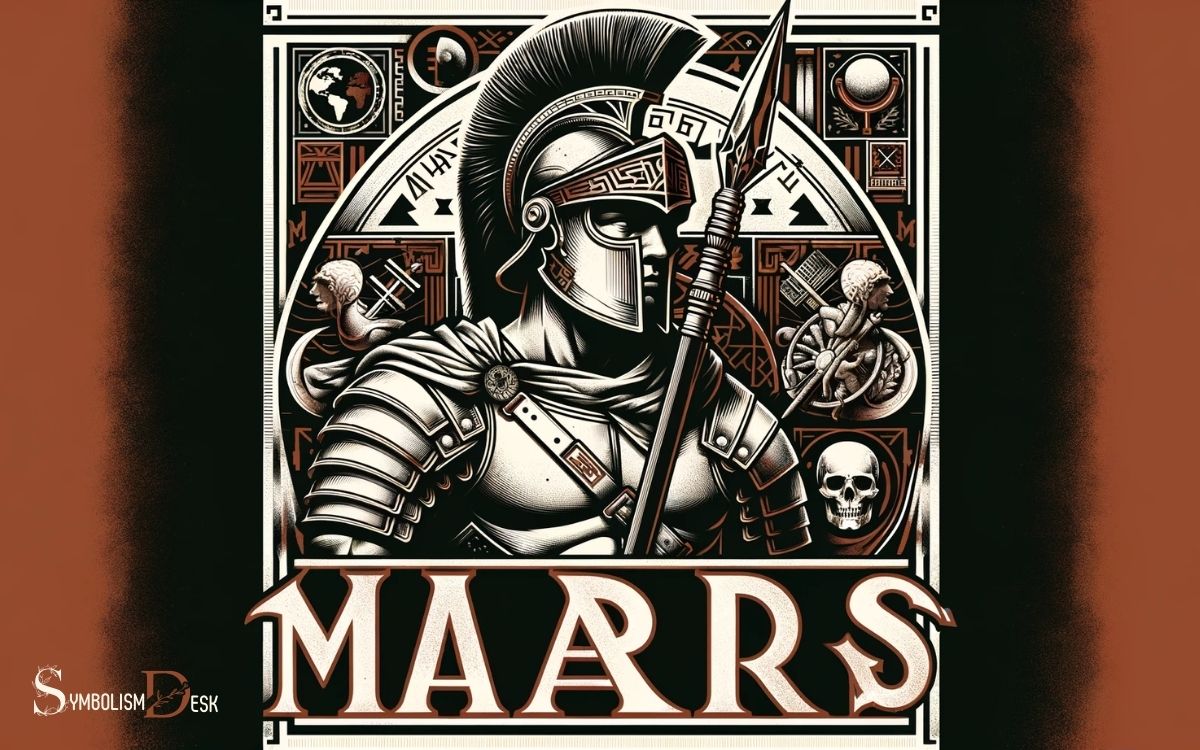Ares Roman Name and Symbol: Mars!
The Roman name for Ares, the Greek god of war, is Mars. The symbol most commonly associated with Mars/Ares is the spear and shield, embodying the aspects of warfare and combat prowess.
Ares is a prominent deity in Greek mythology known for his fierce nature and embodiment of the violent and physical aspects of war. In Roman mythology, he is known as Mars, who not only represents war but also serves as a guardian of agriculture.
The transformation between cultures illustrates a nuanced shift in the god’s perceived roles and importance among the Roman people, compared to the Greeks.
The symbols of Ares/Mars are significant:
Mars, as the Roman version of Ares, holds a complex identity, symbolizing both the might of the warrior and the nurturing force behind Rome’s agricultural prosperity.

Key Takeaway
The Origins of Ares/Mars
The origins of Ares, also known as Mars in Roman mythology, can be traced back to the ancient Greek and Roman civilizations. Ares was primarily known as the Greek god of war, representing the physical, violent, and untamed aspects of war.
In Roman mythology, Ares was identified with Mars, the Roman god of war, who was also considered a guardian of agriculture and the state. Both Ares and Mars were revered as symbols of strength, courage, and military prowess.
In ancient Greece, Ares was often depicted as a violent and bloodthirsty deity, while in Rome, Mars was seen as a more disciplined and strategic force in warfare.
Understanding the origins and evolution of Ares/Mars provides valuable insights into the cultural and religious beliefs of these ancient civilizations.
Ares/Mars in Roman Mythology
In Roman mythology, Ares, known as Mars, played a significant role as the god of war and also held the position of guardian over agriculture and the state, building upon the foundation laid in ancient Greek mythology.
- Mars was considered the father of Romulus and Remus, the legendary founders of Rome, emphasizing his importance in Roman culture and history.
- He was often depicted as a fierce warrior, representing the military prowess and strength of the Roman Empire.
- Mars was also associated with spring and fertility, highlighting his dual role as a war god and a guardian of agriculture.
- Festivals like the Armilustrium were dedicated to Mars, reflecting the Roman reverence for him as a protector of the state and the Roman people.
Symbols and Attributes of Ares/Mars
What symbols and attributes are associated with Ares/Mars in Roman mythology? Ares, known as Mars in Roman mythology, is commonly associated with symbols and attributes that reflect his role as the god of war, courage, and masculinity.
These symbols and attributes are often depicted in various forms of art and literature, showcasing the characteristics and qualities attributed to Ares/Mars.
The following table highlights some of the key symbols and attributes associated with Ares/Mars in Roman mythology:
| Symbol/Attribute | Description | Representation |
|---|---|---|
| Spear | Weapon of war | Often depicted in the god’s hand |
| Shield | Protection and defense in battle | Featured alongside the god in art |
| Helmet | Symbol of warfare and invincibility | Worn by the god in artistic portrayals |
These symbols and attributes serve as visual and conceptual representations of Ares/Mars’ significance in Roman mythology.
Ares/Mars in Art and Architecture
Depictions of Ares/Mars in art and architecture often showcase the god’s association with warfare and valor through the use of symbols such as spears, shields, and helmets.
These representations serve to convey deeper meanings to the audience:
- Symbolism of Weapons: The presence of spears and shields symbolizes the god’s role as a warrior and protector in battle.
- Depiction of Strength: The muscular and powerful physique of Ares/Mars in sculptures and paintings emphasizes his embodiment of strength and courage.
- Architectural Significance: Temples and monuments dedicated to Ares/Mars often feature intricate carvings and reliefs depicting scenes of battle and triumph, serving as a visual representation of the god’s influence in war.
- Cultural Impact: These artistic representations not only honor the deity but also reflect the societal values placed on bravery and military prowess.
Legacy and Influence of Ares/Mars
The legacy and influence of Ares/Mars is evident in the military strategies and valorous ideals attributed to the god. As the god of war, Ares/Mars continues to influence military tactics and warfare philosophy.
The concept of strategic planning and the art of war have been deeply intertwined with the characteristics associated with Ares/Mars.
The valor, bravery, and the willingness to fight for a just cause are still regarded as essential virtues in many military traditions, drawing inspiration from the mythology surrounding Ares/Mars.
Moreover, the god’s influence extends beyond warfare, shaping societal perspectives on courage, strength, and determination.
Ares/Mars remains a symbol of the complexities and paradoxes of war, challenging individuals and societies to understand and navigate the intricate aspects of conflict and its aftermath.
Conclusion
The Roman god Ares, known as Mars, has a rich and complex history in mythology, art, and architecture. His symbols and attributes, such as the spear and the shield, have left a lasting impact on Western culture.
From ancient times to the present day, the legacy of Ares/Mars continues to captivate and inspire countless individuals, making him a truly larger-than-life figure in the pantheon of Roman gods.






